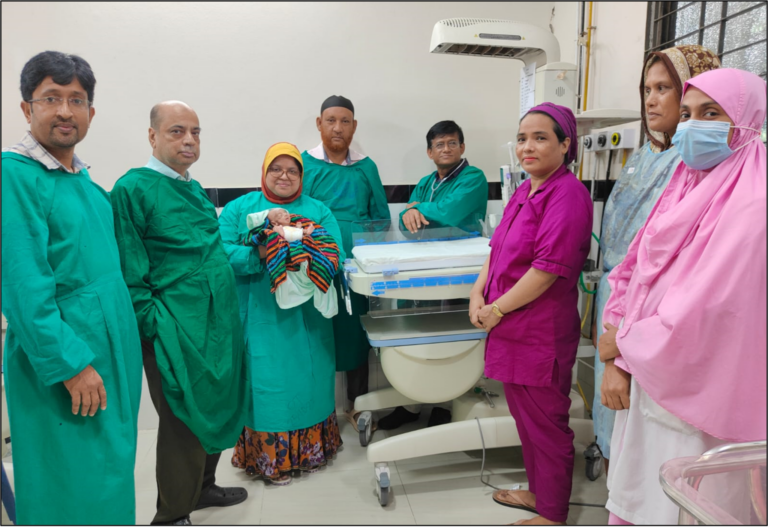Photo Caption: The baby at the time of discharge with the medical team members of the Mohammadpur Fertility Services and Training Centre (MFSTC). Credit: Paediatrics Department, MFSTC.
“In the beginning, Vayu bCPAP (bubble continuous positive airway pressure) played an important role to recover from RDS (respiratory distress syndrome) and KMC (kangaroo mother care) was helpful to keep the baby warm. With each passing day, there were moments when it seemed like we might lose the baby. But we never stopped and maintained our efforts till the end. I am so happy that the baby has made finally a full recovery. I want to share one more thing – that I feel more confident to provide services after receiving training on newborn health from the SWAP project.” – Shamsun Nahar, the senior staff nurse of the special care newborn unit (nursing-in-charge)
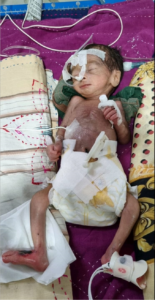
Mohammadpur Fertility Services and Training Centre (MFSTC), a tertiary level hospital under the Government of Bangladesh Directorate General of Family Planning (DGFP), located in Dhaka District, plays an essential role in the implementation of life-saving maternal and newborn health care with a strong commitment to ensure the highest quality of services. The Save the Children Saving Women and Premature Babies (SWAP) project supports MFSTC with technical assistance in continuing these initiatives.
Let us delve into the heartwarming journey of a mother named Ms. Khadiza, whose blessed baby will be the heart of the story. Her first pregnancy concluded in tragedy when her baby experienced stillbirth at seven months of gestational age. Unfortunately, at that time they were unaware of the cause. This heartbreaking loss deeply affected Khadiza and her family.
As she entered her second pregnancy, Khadiza and her family became more careful and determined to ensure a healthier outcome of the pregnancy this time. Their need led them to MFSTC as they came to know that this facility ensures quality of care in a cost-effective way. Throughout her pregnancy Khadiza received antenatal care twice at MFSTC with her first visit occurring on the 28th week and her second on the 32nd week of pregnancy. The day was 6th August 2023. Under the supervision and guidance of the Senior Consultant of Gynaecology and Obstetrics, the SWAP-trained health service providers of MFSTC successfully conducted a normal vaginal delivery for Khadiza. She gave birth to a premature baby boy, at 8 months and 15 days (36 weeks) of her pregnancy. The baby was only 970gm just after birth. He was examined immediately by a neonatologist in the labor ward and transferred to the special care newborn unit (SCANU) with the diagnoses of preterm with extremely low birth weight with intrauterine growth restriction and respiratory distress syndrome (RDS).
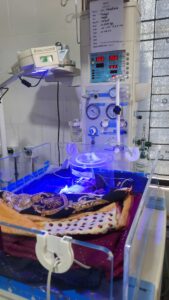
The struggle of the expert doctors and healthcare providers, as well as the guardians, to save the newborn started right then, which continued for a long 37 days. As the baby had breathing difficulties, he needed continuous oxygen support. Treatment started with 1 liter of oxygen by nasal canula and gradually increased up to 8 liters by both nasal canula and head box. On 10th August 2023, the medical team initiated him in Vayu bubble continuous positive airway pressure (bCPAP) as his oxygen saturation was only 79% along with a heart rate of 165 beats/min despite continuous airway support. Vayu bCPAP is a high-quality newborn and infant bCPAP system that does not require electricity, compressed medical air, or manual power to operate and used to treat respiratory distress syndrome in newborns. On 12th August 2023 they weaned him from Vayu bCPAP as his oxygen saturation had improved to 94%.
Since the baby was unable to breastfeed, he was supported with nasogastric tube feeding, and milk from other mothers was collected in a sterile manner to ensure his nourishment. In that time the baby developed neonatal jaundice, sepsis and anemia and was treated accordingly.
On 25th August 2023, a blood test revealed a decrease of serum albumin level (2.39) and hemoglobin of 7 gm/dl which indicates hypoalbuminemia (low serum protein) and anemia, respectively. To address these conditions, the medical team administered three blood transfusions, three doses of human albumin, and Lasix to manage his fluids as part of the treatment procedure.
The baby was finally diagnosed as a case of preterm (36 weeks), extremely low birth weight (970 gm) with neonatal sepsis with neonatal jaundice. Here, it is important to mention that Khadiza developed post-partum depression after giving birth to the baby. The symptoms included withdrawing from family and baby, crying, and mood swings in repeated intervals. The medical team provided continuous psychological support and ensued her wellbeing in a very compassionate way. That’s why the maternal baby’s grandmother took the best surrogate care of her grandchild through the whole journey. At a certain point, the financial burden of the baby’s medical expenses became overwhelming for the family. During this critical period, the honorable Director of MFSTC, Dr. MD. Muniruzzaman Siddiqui and the team extended their support to manage the baby’s treatment cost.
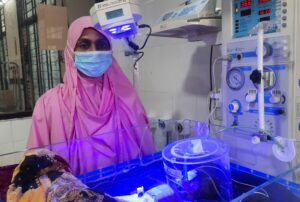
After a few days of treatment, the baby was stable, and he was initiated to kangaroo mother care (KMC) weighing 850gm on 4th September 2023. The baby had undergone excessive post-natal weight loss due to high catabolic effect of sepsis. His grandmother provided him the KMC, which included early, continuous, and prolonged skin-to-skin contact between her and the baby. The baby’s weight increased to 950gm on 11th September 2023 resulting from uninterrupted KMC support. The baby, being a fighter, was finally released from the hospital on that day, concluding a lengthy struggle in which every healthcare professional and family member dedicated significant effort throughout his time in the SCANU. The utilization of the innovative Vayu bCPAP approach as a treatment support for respiratory disease and continued KMC support proved effective in sustaining the baby’s treatment process.
“First of all, all praise to the Almighty. Then, heartfelt thanks and gratitude to our most dedicated team, which includes the service providers from every tier. And last but not the least, appreciating the grandmother, who played the invincible role. Hopefully this milestone will be boosting up our journey towards mankind. Save the Children’s SWAP project had supported in capacity building of the service providers and Vayu implementation at the facility, which boosted the service providers to perform their responsibilities more confidently.” – Dr. MD. Muniruzzaman Siddiqui, Director of MFSTC
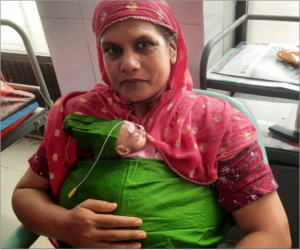
In the end, the baby was able to breath on this beautiful earth. Dr. Tarun, the Head of the Department Neonatology, who was involved in the supervision of the baby until the last day, said, “It is a great success for the Neonatal Team under the monitoring of Director, MFSTC. I think it is an exceptional triumph for MFSTC. It was only possible through our hard teamwork.” Throughout the entire journey, we observed the challenging moments in the life of a premature baby, marked by extreme complications. Simultaneously, we have also witnessed the dedicated care and patience of the healthcare professionals as they took every necessary step to ensure the baby’s recovery.
“We are so much happy that our baby is now recovered, and I am very thankful to the doctors, nurses, and all who were there to make it possible. They took proper care of the baby and guided us properly.” – The baby’s grandmother
